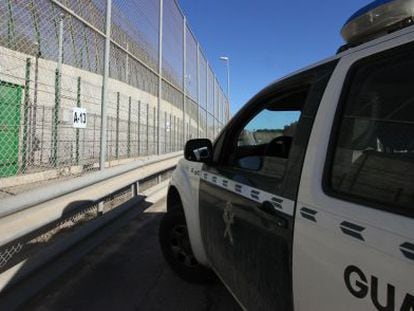Interior Minister declares “state emergency” during visit to Melilla
Spanish exclaves buckle under weight of mass attempts by immigrants to reach EU soil Kamikaze car entry attempt foiled by officials on Moroccan side
A day after visiting the Spanish exclave of Ceuta, where last month 15 immigrants lost their lives during an en masse attempt to reach European soil, Interior Minister Jorge Fernández Díaz spoke of a “state emergency” while in Melilla, Spain’s other territory in North Africa.
The minister expressed the government’s support for the local administration in Melilla and for the Civil Guard and other security forces charged with maintaining the integrity of Spain’s border with Morocco in the face of a wave of increasingly desperate attempts to breach the frontier defenses by would-be sub-Saharan immigrants. Earlier this week the single largest assault on the frontier was launched by over 1,000 people.
“At the moment we have a situation of migratory pressure similar to that of 2005 and 2006, when people died in both Ceuta and Melilla,” Fernández Díaz said. “This problem should be treated as a policy of state in cooperation with the European Union.”
The minister came out in defense of the Civil Guard officers who were on duty on Tarajal beach on February 6, when dozens of migrants took the sea in an effort to bypass the frontier, which stretches out into the Mediterranean in the form of a fortified breakwater. Rubber bullets were fired – although this was initially denied by the Interior Ministry – and 15 people drowned in the ensuing chaos.
“Accusing the officers is unjust, undignified and immoral,” Fernández Díaz said.
The minister took a tour of the frontier fences – a six-meter high structure of two barriers topped with razor wire – in the company of the premier of Melilla, Juan José Imbroda and central government delegate Abdelmalik El Barkani, and met with police and Civil Guard chiefs. Fernández Díaz also visited the autonomous city’s temporary immigration internment center (CETI), which currently holds 1,300 people despite having an official maximum capacity of 480.
Imbroda lamented the fact that “the balance” of the situation has been focused solely on the “human drama” of the immigrants and the peoples of their countries of origin. “It also has be emphasized that a very serious situation could arise if this irregular immigration, which is always illegal, enters Melilla at some point.” On February 28, 200 people managed to get into the exclave during another mass attempt.
Also Thursday, 14 would-be immigrants staged a kamikaze bid to enter Melilla by driving an all-terrain vehicle toward the frontier check points. Among the passengers were men, women and children. Moroccan security forces thwarted the attempt by using “stinger spike” strips to burst the tires and halt the vehicle’s advance. Police sources said that the practice of kamikaze attempts by car and motorbike pose a “very dangerous” threat both to security agents and immigrants.













































